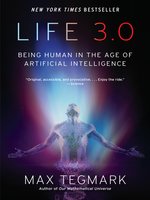-

July 10, 2017
The robot takeover will ignite an explosion of “awe-inspiring” life even if humans don’t survive, according to this exhilarating, demoralizing primer. MIT physicist Tegmark (Our Mathematical Universe) surveys advances in artificial intelligence such as self-driving cars and Jeopardy-winning software, but focuses on the looming prospect of “recursive self-improvement”—AI systems that build smarter versions of themselves at an accelerating pace until their intellects surpass ours. Tegmark’s smart, freewheeling discussion leads to fascinating speculations on AI-based civilizations spanning galaxies and eons—and knotty questions: Will our digital overlords be conscious? Will they coddle us with abundance and virtual-reality idylls or exterminate us with bumblebee-size attack robots? While digerati may be enthralled by the idea of superintelligent civilizations where “beautiful theorems” serve as the main economic resource, Tegmark’s future will strike many as a one in which, at best, humans are dependent on AI-powered technology and, at worst, are extinct. His call for strong controls on AI systems sits awkwardly beside his acknowledgment that controlling such godlike entities will be almost impossible. Love it or hate it, it’s an engrossing forecast.
-

July 1, 2017
The founder of the Future of Life Institute explores one of the most intriguing scientific frontiers, artificial general intelligence, and how humans can grow along with it.Nowadays, computers read, learn, recognize faces, translate languages, and consult other computers. They don't yet think, but the contingent of researchers who believe that they will never be smarter than humans is steadily shrinking. In this expert but often wildly speculative rumination, Tegmark (Physics/MIT; Our Mathematical Universe: My Quest for the Ultimate Nature of Reality, 2014, etc.) joins the fierce debate on what will happen when AGI reaches human level and beyond. He dismisses tabloid scenarios of rampaging robots but warns, "we might create societies that flourish like never before...or a Kafkasque global surveillance state so powerful that it could never be toppled." The author defines intelligence as the ability to accomplish complex goals. This sounds trivial until he points out that both brains and computers are able to do this. Since computers are improving faster than brains, superhuman AGI will happen, and a beneficial outcome is not guaranteed. Thus, autonomous, self-driving cars will save lives. Autonomous battlefield drones will save soldiers' lives, but keeping them away from rogue nations, terrorists, and criminals will prove impossible. In the early chapters, Tegmark portrays near futures that range from Utopian to Orwellian. Later in the book, he delivers a vision of the far future: a universe filled with the products of superintelligence, with organic Homo sapiens a distant memory. Throughout, the author lays out his ideas in precisely detailed scenarios. Many read like science fiction; others, such as a fine chapter on the nature of consciousness, are simply good popular science. Prophesies have a dreadful record, but they are also endlessly fascinating. Readers may balk now and then--Tegmark's solutions to inevitable mass unemployment are a stretch--but most will find the narrative irresistible.
COPYRIGHT(2017) Kirkus Reviews, ALL RIGHTS RESERVED.
-

September 15, 2017
Tegmark (physics, MIT; Our Mathematical Universe) is a cofounder (along with his wife and colleagues) of the nonprofit Future of Life Institute, which focuses on improving the future through technology, an idea that inspired the creation of this book. The narrative begins with a fictional tale of a team that creates an artificial intelligence (AI) called Prometheus, which has the ability to learn and adapt and possibly take over multiple industries. The story of Prometheus is brought up again in later chapters when human-level AI is discussed and leads into what the author deems the most important conversation of our time. According to the author, AI has real-world applications that are already being implemented such as self-driving cars, computer viruses, manufacturing robots, and even weaponry. These technologies are discussed along with the possible future of the next billion years. The technical and scientific reading material is divided by illustrations and graphs, and Tegmark provides bulleted key points at the end of every chapter. VERDICT A must-read for those entrenched in technology and future AI applications; however, this work is not for the casual reader.--Natalie Browning, J. Sargeant Reynolds Community Coll. Lib., Richmond, VASensible tips for new homeowners, reining in an unstoppable flame & the freedom of mustangs
Copyright 2017 Library Journal, LLC Used with permission.
-

October 2, 2017
MIT physicist Tegmark explores the pivotal role that artificial intelligence will play in the future of humankind. From chores around the house and what employment will look like to how death might be rethought and even what it will mean to live among the stars, Tegmark considers what self-replicating and self-improving intelligent beings will mean for humans from many angles. Shapiro has a gentle and nonchalant voice that moves effortlessly through technical descriptions of AI technology and its potential upheaval of society. His steady but deliberate narration helps listeners maintain focus and feel comfortable with a variety of topics that Tegmark touches upon, such as how AI works and what it could mean for law enforcement, employment, and political organization. Even as Tegmark veers toward the philosophical, Shapiro keeps listeners attuned. A Knopf hardcover.
-
AI systems that build smarter versions of themselves at an accelerating pace until their intellects surpass ours. Tegmark's smart, freewheeling discussion leads to fascinating speculations on AI-based civilizations spanning galaxies and...
"Exhilarating....MIT physicist Tegmark surveys advances in artificial intelligence such as self-driving cars and Jeopardy-winning software, but focuses on the looming prospect of "recursive self-improvement"







